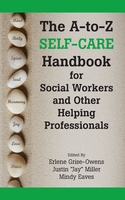
Photo credit: BigStockPhoto/thinglass
by Erlene Grise-Owens, EdD, LCSW, MSW, MRE, & Justin “Jay” Miller, PhD, MSW, CSW
Happy Social Work Month!
It’s time for our annual update on self-care in the social work profession. This year’s theme—Empowering Social Workers: Inspiring Action. Leading Change—presents an opportunity to highlight how self-care is paramount for empowering social workers.
Self-Care as Empowerment
Empowerment: “The process of helping individuals, families, groups, and communities increase their personal, interpersonal, socioeconomic, and political strengths and develop influence toward improving their circumstances” [emphases added] (Barker, 2014)
Initially, you might wonder what self-care has to do with empowerment. Actually, they’re inextricably related. Like empowerment, self-care is a process of increasing strengths and developing influence toward improving one’s circumstances. Self-care is a wholistic lifestyle that promotes one’s well-being. As such, it’s an ongoing process that accesses strengths to cultivate approaches, resources, and competencies to positively influence one’s own circumstances.
In social work, “empowerment” typically refers externally to clients, causes, and communities. We neglect applying it to ourselves. As the above definition connotes, empowerment of individuals, with attention to the personal, is a primary entry point for effecting change. This point applies to practitioners, too. Without serious attention to practitioner self-care, efforts to inspire action and lead change are stymied. Inattention to this essential micro-aspect of systemic empowerment—i.e., self-care—leads to exponential human harm, professional losses, and diminished impact.
Em-POWER-ment: Reframing and Reclaiming Our POWER-Fullness
“The most common way people give up their power is by thinking they don’t have any.”—Alice Walker
It’s all about power. Clearly, power is the central component of empowerment. Likewise, self-care is about power, including power we often give up by thinking we don’t have any. The dominant conceptualization of power is as “power over.” This framing leads to scarcity-thinking and adversarial approaches. However, it’s critical to identify other forms of power (Finn, 2020).
Here, we delineate forms of power and provide links to previous blogs to help you access these forms of power through self-care.
- Power Within involves self-awareness, self-compassion, and self-love. Although self-care certainly includes soothing strategies, it’s not just “feel good.” Self-care is sometimes painful, difficult, uncomfortable, and boring. This power builds strengths and resilience necessary for navigating our complex profession and having a meaningful life.
- Power With is closely linked to power within. Self-care isn’t limited to solitary endeavors; it includes connections. However, all relationships/communities are comprised of individuals. The quality of the experiences of power with others depends on the well-being of the individuals engaging in connection. Self-care involves nurturing healthy relationships and mitigating toxic ones.
- Power To Do relates to having abilities to act—both individually and collaboratively. As such, self-care involves personal and professional areas that influence one’s circumstances. Examples of myriad ways to practice this type of self-care include: financial self-care, home-making, political engagement, and professional self-care strategies.
- Power To Be is a form of power we’re adding to those listed by Finn. Honoring and accessing this conceptualization of power is woefully lacking in our dominant culture of “do more.” The self-care metaphor of breath emphasizes that, at its core, self-care helps us be powerfully flourishing human beings.
- Power Over—reframed! Too often, people give up power by conceding absolute power to something “over” us—e.g., organization, cultural norm, or person/authority. Certainly, these (oftentimes) oppressive and toxic forces have significant power. However, accessing all forms of power through self-care empowers us to have more influence over our own circumstances. Emphatically, self-care is not contrary to larger systems impact. It’s essential for it.
Ultimately, self-care is about rejecting the typical approach of depleting our power through self-lessness and instead moving us into empowering Self-Fullness. Self-care involves engaging our POWER-Fullness, instead of giving it up.
EmPOWERing To Inspire Action and Lead Change
“Self-Care is paramount”—NASW & CSWE
In recent years, NASW (2021) and CSWE (2022) asserted that self-care is paramount. As stated in previous blogs, we applaud this progress and urge these entities (and others) to take much more significant steps to move the profession from aspirational statements to actualized strategies.
We hope this post illuminates the connection between empowerment and self-care to inspire action and lead change. Start with reclaiming your power: Self-Care! Then, inspire action within your related spheres through leading changes that actualize practitioner well-being as paramount.
Sources
Barker, R. L. (2014, 6th edition). The social work dictionary. NASW Press.
Council on Social Work Education (CSWE). (2022). Educational policy and accreditation
standards.
Finn, J. L. (2020, 4th edition). Just practice: A social justice approach to social work. Oxford
University Press.
National Association of Social Workers (NASW). (2021). Code of ethics.
Erlene Grise-Owens, EdD, LCSW, MSW, MRE, is a Partner in The Wellness Group, ETC. This LLC provides evaluation, training, and consultation for organizational wellness and practitioner well-being. Dr. Grise-Owens is lead editor of The A-to-Z Self-Care Handbook for Social Workers and Other Helping Professionals. As a former faculty member and graduate program director, she and a small (but mighty!) group of colleagues implemented an initiative to promote self-care as part of the social work education curriculum. Previously, she served in clinical and administrative roles. She has experience with navigating toxicity and dysfunction, up-close and personal! Likewise, as an educator, she saw students enter the field and quickly burn out. As a dedicated social worker, she believes the well-being of practitioners is a matter of social justice and human rights. Thus, she is on a mission to promote self-care and wellness!
Dr. Justin “Jay” Miller, PhD, MSW, CSW, is the Dean, Dorothy A. Miller Research Professor in Social Work Education, and Director of the Self-Care Lab in the College of Social Work at the University of Kentucky. You can follow his work via Twitter @DrJayMiller1.

